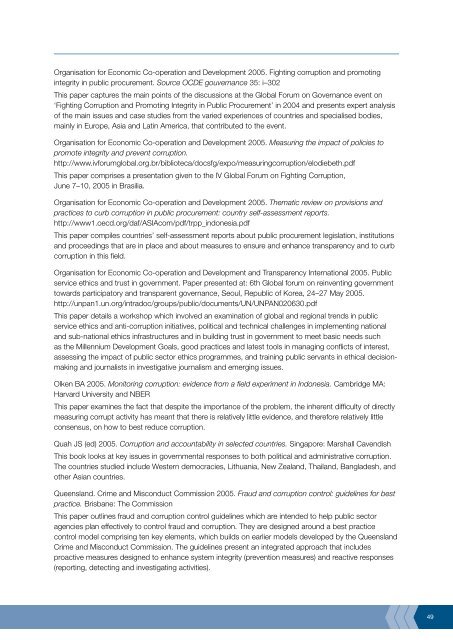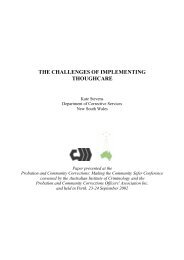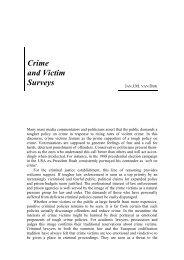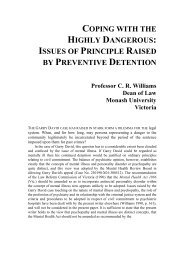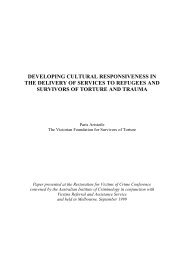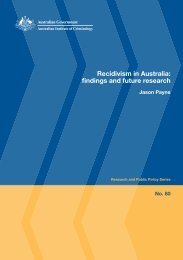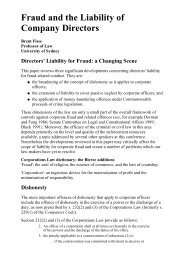Review of anti-corruption strategies Rob McCusker - Australian ...
Review of anti-corruption strategies Rob McCusker - Australian ...
Review of anti-corruption strategies Rob McCusker - Australian ...
You also want an ePaper? Increase the reach of your titles
YUMPU automatically turns print PDFs into web optimized ePapers that Google loves.
Organisation for Economic Co-operation and Development 2005. Fighting <strong>corruption</strong> and promoting<br />
integrity in public procurement. Source OCDE gouvernance 35: i–302<br />
This paper captures the main points <strong>of</strong> the discussions at the Global Forum on Governance event on<br />
‘Fighting Corruption and Promoting Integrity in Public Procurement’ in 2004 and presents expert analysis<br />
<strong>of</strong> the main issues and case studies from the varied experiences <strong>of</strong> countries and specialised bodies,<br />
mainly in Europe, Asia and Latin America, that contributed to the event.<br />
Organisation for Economic Co-operation and Development 2005. Measuring the impact <strong>of</strong> policies to<br />
promote integrity and prevent <strong>corruption</strong>.<br />
http://www.ivforumglobal.org.br/biblioteca/docsfg/expo/measuring<strong>corruption</strong>/elodiebeth.pdf<br />
This paper comprises a presentation given to the IV Global Forum on Fighting Corruption,<br />
June 7–10, 2005 in Brasilia.<br />
Organisation for Economic Co-operation and Development 2005. Thematic review on provisions and<br />
practices to curb <strong>corruption</strong> in public procurement: country self-assessment reports.<br />
http://www1.oecd.org/daf/ASIAcom/pdf/trpp_indonesia.pdf<br />
This paper compiles countries’ self-assessment reports about public procurement legislation, institutions<br />
and proceedings that are in place and about measures to ensure and enhance transparency and to curb<br />
<strong>corruption</strong> in this field.<br />
Organisation for Economic Co-operation and Development and Transparency International 2005. Public<br />
service ethics and trust in government. Paper presented at: 6th Global forum on reinventing government<br />
towards participatory and transparent governance, Seoul, Republic <strong>of</strong> Korea, 24–27 May 2005.<br />
http://unpan1.un.org/intradoc/groups/public/documents/UN/UNPAN020630.pdf<br />
This paper details a workshop which involved an examination <strong>of</strong> global and regional trends in public<br />
service ethics and <strong>anti</strong>-<strong>corruption</strong> initiatives, political and technical challenges in implementing national<br />
and sub-national ethics infrastructures and in building trust in government to meet basic needs such<br />
as the Millennium Development Goals, good practices and latest tools in managing conflicts <strong>of</strong> interest,<br />
assessing the impact <strong>of</strong> public sector ethics programmes, and training public servants in ethical decisionmaking<br />
and journalists in investigative journalism and emerging issues.<br />
Olken BA 2005. Monitoring <strong>corruption</strong>: evidence from a field experiment in Indonesia. Cambridge MA:<br />
Harvard University and NBER<br />
This paper examines the fact that despite the importance <strong>of</strong> the problem, the inherent difficulty <strong>of</strong> directly<br />
measuring corrupt activity has meant that there is relatively little evidence, and therefore relatively little<br />
consensus, on how to best reduce <strong>corruption</strong>.<br />
Quah JS (ed) 2005. Corruption and accountability in selected countries. Singapore: Marshall Cavendish<br />
This book looks at key issues in governmental responses to both political and administrative <strong>corruption</strong>.<br />
The countries studied include Western democracies, Lithuania, New Zealand, Thailand, Bangladesh, and<br />
other Asian countries.<br />
Queensland. Crime and Misconduct Commission 2005. Fraud and <strong>corruption</strong> control: guidelines for best<br />
practice. Brisbane: The Commission<br />
This paper outlines fraud and <strong>corruption</strong> control guidelines which are intended to help public sector<br />
agencies plan effectively to control fraud and <strong>corruption</strong>. They are designed around a best practice<br />
control model comprising ten key elements, which builds on earlier models developed by the Queensland<br />
Crime and Misconduct Commission. The guidelines present an integrated approach that includes<br />
proactive measures designed to enhance system integrity (prevention measures) and reactive responses<br />
(reporting, detecting and investigating activities).


